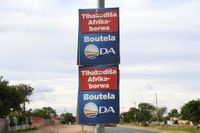A recent poll conducted by the Institute of Race Relations (IRR) has revealed a significant shift in South African political dynamics, with the Democratic Alliance (DA) surpassing the African National Congress (ANC) in voter support for the first time. The survey, which was conducted between March 27 and April 3, indicates that the DA's support has risen to 30.3%, while the ANC's has dropped to 29.7%. This marks a pivotal moment in South African politics, suggesting a potential shift towards socio-economic concerns over traditional identity-based grievances.
According to the IRR, the DA has seen a remarkable increase in support among black registered voters, tripling from 5% to 18%. This surge is attributed to the ANC's unpopular proposal to raise Value Added Tax (VAT), which has alienated many voters. Hermann Pretorius, the head of strategic communications at the IRR, noted that this shift demonstrates the DA's potential to grow across traditional divides by focusing on pragmatic policy issues, particularly economic concerns.
Gareth van Onselen, an analyst, also commented on the volatility of the ANC's support base, highlighting that 10-15% of its voters are fluid and may shift their allegiance during times of instability. He pointed out that the ANC's support tends to hover around 40% during stable periods but plummets to around 30% during crises, such as the recent backlash against the proposed VAT increase. This instability has opened the door for the DA to capitalize on the ANC's missteps.
The IRR's findings suggest that economic growth and "bread and butter" issues are becoming increasingly important in shaping South Africa's political landscape. The ongoing debate surrounding the VAT increase, proposed by Finance Minister Enoch Godongwana, has sparked a crisis within the government of national unity (GNU). As the ANC struggles to maintain its support, the DA appears to be positioning itself as a stabilizing force, gaining traction among voters who are dissatisfied with the current administration.
In a recent webinar, Pretorius emphasized the significance of these polling results, stating that they reflect a growing disenchantment with the ANC's socio-economic policies. The IRR's survey methodology involved 807 respondents, ensuring a diverse demographic cross-section with a margin of error of ±4% at a 95% confidence level. This reliable data collection method adds weight to the findings, suggesting that the shift in voter sentiment is genuine and not merely a statistical anomaly.
As the political landscape evolves, the DA's ability to attract a broader base of support, particularly among black voters, could reshape the future of South African politics. The IRR's analysis indicates that the DA's growth potential lies in its focus on economic issues rather than identity politics, which have historically dominated the discourse.
In the face of the ANC's declining support, the party must reevaluate its strategies to retain its core voters and address the concerns of those who are increasingly disillusioned. The IRR's findings suggest that the ANC's leadership may need to shift its focus from internal ambitions to a more comprehensive approach that addresses the pressing economic challenges facing the nation.
The implications of this polling data are profound, as it not only reflects current voter sentiment but also hints at potential changes in the balance of power within the GNU. With the DA's rising support, the party could play a more influential role in shaping policy decisions and addressing the concerns of South African citizens.
As the country approaches the anniversary of last year's elections, the significance of these polling results cannot be understated. The IRR's findings indicate that the political landscape is becoming more competitive, with the DA and ANC vying for the same voters. This contest for the "moderate middle" could lead to a more dynamic political environment, where economic issues take precedence over traditional party lines.
In conclusion, the latest polling data from the IRR has unveiled a critical juncture in South African politics, with the DA's support surpassing that of the ANC for the first time. This shift, driven by economic concerns and dissatisfaction with the ANC's policies, signals a potential change in the political landscape, where socio-economic issues may take center stage. As the political climate continues to evolve, the DA's ability to maintain and expand its support among diverse voter groups will be crucial in shaping the future of South Africa.




